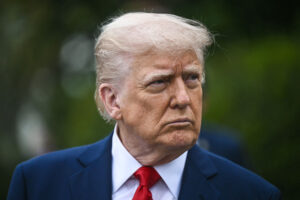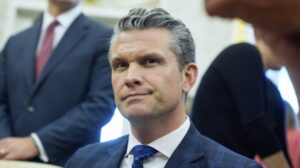Congress
SBA staff at Washington headquarters would shrink under Ernst bill
Sen. Joni Ernst wants to make restructuring the Small Business Administration one of her first legislative acts as chair of the Senate caucus carrying out Donald Trump’s “Department of Government Efficiency” agenda.
The Iowa Republican‘s bill that she will announce Thursday would require the SBA administrator to relocate at least 30 percent of workers at its headquarters outside the Washington metro area, according to a copy of legislation obtained by Blue Light News.
SBA would then reduce the office space at its headquarters by at least 30 percent, under her legislation.
“The empty SBA headquarters shows its employees clearly don’t want to work in Washington, so we are going to make their wish come true,” Ernst said in a statement. “Not only will they be closer to the folks they serve but it will give more Americans the opportunity to join the agency and bring new ideas and innovation.”
The bill comes after Ernst used the first meeting of the Senate DOGE caucus last week to hand out a report on remote and tele-working within the federal government. As part of that plan she floated moving more of the federal workforce outside of Washington, and consolidating government office spaces to save money. Ernst has already met with the DOGE team and sent them a letter late last month proposing potential areas for cuts.
The legislation is the latest example of Republicans gearing up to position themselves as vocal allies of the so-called Department of Government Efficiency, an out-of-government effort spearheaded by Elon Musk and Vivek Ramaswamy. In addition to the Senate caucus, the House has started a bipartisan DOGE caucus. House Republicans will also create a new Oversight subcommittee, led by Rep. Marjorie Taylor Greene (R-Ga.), that will coordinate with DOGE.
Musk and Ramaswamy also met with House and Senate Republicans last week, where lawmakers pitched them behind-closed-doors on their ideas for how to shrink the side of the federal government or overhaul spending.
Congress
George Santos, who conned his way to Congress before getting booted, sentenced to more than 7 years in prison
CENTRAL ISLIP, New York — A federal judge on Friday sentenced disgraced former Rep. George Santos to more than seven years in prison for wire fraud and aggravated identity theft in a case that resulted in his expulsion from Congress and capped a colorful flameout for the first-term Republican.
The 87-month sentence for Santos, who wept as it was announced, comes after a memorable one-year stint in Congress in which he was exposed, in prosecutors’ words, as a “pathological liar and fraudster.”
In imposing the lengthy sentence, U.S. District Judge Joanna Seybert decried his “flagrant thievery,” describing him as “an arrogant fraudster talking out of both sides of his mouth.”
His voice shaking, Santos told the court, “I betrayed the confidence entrusted to me by constituents, donors, colleagues and this court.”
He must report to prison by July 25. Seybert also ordered him to pay more than $373K in restitution, due immediately, and to serve two years supervised release.
Santos’ political saga gripped Washington and New York, where he flipped a Long Island House seat in a little-watched 2022 race that led to his prominent rise and ultimate downfall. After prosecutors charged him in May 2023, he refused to resign, buoyed by the support of many House Republicans. That support eventually dwindled, however, and Santos became the first member since the Civil War to be booted from the House without a conviction.
In August 2024, he pleaded guilty to two felony charges and acknowledged he used his campaign fundraising apparatus for personal gain. He admitted to submitting false reports to the FEC during his congressional run and to stealing the personal identity and financial information of elderly and cognitively impaired campaign donors. He fraudulently charged their credit cards, making unauthorized contributions to his campaign and others.
He also admitted to persuading donors to contribute money to a company that he claimed was a social welfare organization or super PAC, when in fact he used their contributions to put himself up at the Venetian Hotel in Las Vegas, shop at Hermès, Louis Vuitton and Brooks Brothers, pay off his credit cards and gift himself thousands of dollars in cash.
“His campaign for Congress didn’t turn him into a fraudster,” prosecutor Ryan Harris said at the sentencing. “It simply revealed him for what he already was.”
The criminal investigation and a separate congressional inquiry, coupled with significant media coverage, revealed that Santos had promoted scores of lies about his educational and professional background, as well as numerous other falsehoods, including that his mother died in the Sept. 11, 2001, terrorist attacks.
The House of Representatives voted to expel Santos in 2023 after the ethics committee released an explosive report that found “significant evidence” of Santos’ criminal wrongdoing. Democrats last year won back his Long Island seat in a special election.
“From his creation of a wholly fictitious biography to his callous theft of money from elderly and impaired donors, Santos’s unrestrained greed and voracious appetite for fame enabled him to exploit the very system by which we select our representatives,” prosecutors wrote in their sentencing memo.
They had recommended he receive an 87-month sentence, in large part because, they argued, he wasn’t remorseful. In fact, after prosecutors submitted their sentencing memo, they provided an additional filing to the court highlighting Santos’ social media posts to demonstrate that he remains “unrepentant.”
In one post, he referred to himself as a “scapegoat,” and in another, he denied having used campaign contributions to shop at Hermès. “No matter how hard the DOJ comes for me,” he wrote in another post, “they are mad because they will NEVER break my spirit.”
In a letter to the court, Santos argued that he is “profoundly sorry for the criminal conduct to which I pled guilty,” but that he has the right to “protest” the Justice Department’s request for the lengthy sentence. Santos himself suggested he serve two years, the legal minimum for one of the counts to which he pleaded guilty.
Congress
Lawmakers to attend Pope Francis’ funeral
A bipartisan Senate delegation will attend the funeral of Pope Francis in Rome on Saturday.
“It is a tremendous honor to be selected to lead this bipartisan delegation of United States Senators to Rome to attend the funeral of Pope Francis and pay our respects to his life and legacy,” Republican Sen. Susan Collins, who is leading the trip, said in a statement Friday.
Democratic Sens. Dick Durbin of Illinois and Ed Markey of Massachusetts will join Republican Sens. Mike Rounds of South Dakota and Eric Schmitt of Missouri as part of the Collins-led Senate contingent.
The group marks the first official congressional delegation to announce plans to attend the pope’s funeral, though House members have also discussed traveling to Rome for the event. Lawmakers heard from Francis in a joint meeting on Capitol Hill in 2015 — the first time a pope has ever delivered such an address.
Francis had struggled with health issues in recent years and died at 88 on Easter Monday after a stroke. Tens of thousands of mourners have also lined up to view him lying in state inside St. Peter’s Basilica ahead of the funeral this weekend.
In addition to the showing from Capitol Hill, President Donald Trump is one of several heads of state expected to attend the funeral. It will mark Trump’s foreign trip since the start of his second administration.
Congress
Dick Durbin is retiring from the Senate
CHICAGO — Illinois Sen. Dick Durbin, the No. 2 Senate Democrat and his party’s top leader on the Judiciary Committee, announced Wednesday that he won’t seek a sixth term in 2026.
“I know in my heart it’s time to pass the torch,” the veteran senator said in a social media post Wednesday.
Durbin, who is 80, confirmed what many Democrats have expected for months — that the veteran senator would step aside after three decades in office.
His departure comes at a perilous moment for the judicial system as the Trump administration repeatedly tests the limits of executive power and challenges the authority of the courts.
Illinois Democrats have already been lining up in anticipation of his announcement, hoping for a chance at the Senate seat. Reps. Robin Kelly, Raja Krishnamoorthi and Lauren Underwood, as well as Illinois Lt. Gov. Juliana Stratton and state Sen. Robert Peters, have all signaled an interest in the seat.
Durbin’s exit also opens up a top slot in the Senate Democratic leadership for the first time in a decade. Many in the party have eyed Durbin’s retirement as a prime opportunity to elevate a younger voice into the senior ranks.
Durbin made headlines last month for being one of 10 Democrats who voted with Republicans to advance a GOP-crafted stopgap spending bill. Durbin drew criticism from progressive groups, who used the words “profoundly disappointed” and “cowardice” in calling out his vote.
He told reporters he believed the vote was the “responsible thing to do” to avoid a government shutdown.
The criticism was a blip in Durbin’s career advocating on high-profile national issues and for the state of Illinois.
In 2001, Durbin introduced the DREAM Act, which gives undocumented immigrants who grew up in the U.S. a chance to become citizens. A decade later, he successfully urged then-President Barack Obama, another Illinois native, to stop the deportation of Dreamers. That move led to the Deferred Action for Childhood Arrivals program that exists today.
Durbin has also championed efforts to reform sentencing laws, curb credit card fees and ban smoking on commercial airline flights.
In 2005, Durbin met Tammy Duckworth, then an Army National Guard Blackhawk helicopter pilot who 12 weeks earlier had lost both her legs after being shot down in Iraq. He would become a mentor and advocate for Duckworth as she pursued a political career as assistant secretary of Veterans Affairs and then as a member of the House and Senate.
And in 2022, Durbin led the confirmation of Supreme Court Justice Ketanji Brown Jackson, the first Black woman to sit on the high court.
“In the years to come, one of my grandchildren may ask where I was on the historic day of April 7, 2022, when America broke down what seemed like an impossible racial barrier and voted to send the first Black woman to serve on our highest court,” Durbin said on the Senate floor before her confirmation vote “I will be proud to say I was on the Senate floor, standing at my desk, and casting my vote for Justice Ketanji Brown Jackson.”
Illinois residents know Durbin for his work advocating for infrastructure funding, securing federal dollars to modernize Illinois airports and helping establish the Abraham Lincoln Presidential Library and Museum, which earlier this week honored him for his career.
Durbin was first elected to the Senate in 1996, succeeding Democratic Sen. Paul Simon. In the primary that year, Durbin defeated Pat Quinn, who would later become governor of Illinois. In the general election that year, Durbin defeated Al Salvi, the husband of Kathy Salvi, who now chairs the Illinois Republican Party.
Before his career in the Senate, Durbin practiced law in Springfield, Illinois, and served as legal counsel to Simon and then the Illinois State Senate Judiciary Committee. He then won a U.S. House seat in 1982, serving seven terms before running for Senate.
CORRECTION: An earlier headline on this story referred incorrectly to the length of Durbin’s Senate service. He is in his fifth term.
-

 The Josh Fourrier Show6 months ago
The Josh Fourrier Show6 months agoDOOMSDAY: Trump won, now what?
-
Uncategorized5 months ago
Bob Good to step down as Freedom Caucus chair this week
-

 Politics6 months ago
Politics6 months agoWhat 7 political experts will be watching at Tuesday’s debate
-
Economy6 months ago
Fed moves to protect weakening job market with bold rate cut
-

 Politics6 months ago
Politics6 months agoHow Republicans could foil Harris’ Supreme Court plans if she’s elected
-
Uncategorized5 months ago
Johnson plans to bring House GOP short-term spending measure to House floor Wednesday
-

 Politics6 months ago
Politics6 months agoRFK Jr.’s bid to take himself off swing state ballots may scramble mail-in voting
-
Economy6 months ago
It’s still the economy: What TV ads tell us about each campaign’s closing message










